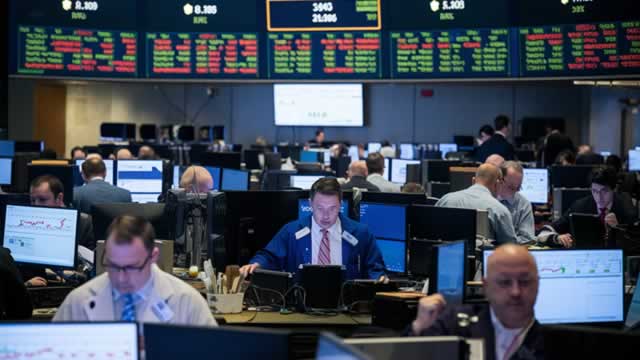Currency and Bond Market Moves Amid Trump Tariff Volatility: Insights from Erik Nelson, Macro Strategist at Wells Fargo
Erik Nelson, a renowned macro strategist at Wells Fargo, recently shared his perspectives on how the currency and bond markets are reacting to the ongoing tariff volatility instigated by the Trump administration. In an exclusive interview, Nelson provided detailed insights into the market trends and their potential implications.
Impact on Currencies
According to Nelson, the tariff war between the United States and its major trading partners has resulted in increased uncertainty, which in turn has led to heightened volatility in currency markets. He explained, “When trade tensions escalate, investors tend to favor safe-haven currencies like the Swiss Franc, Japanese Yen, and the US Dollar.”
To illustrate this point, Nelson cited the recent depreciation of the Chinese Yuan and the Turkish Lira. “The Chinese Yuan has been under pressure due to concerns over the country’s economic health and its role in the ongoing trade dispute with the US. Similarly, the Turkish Lira has been hit hard by the country’s deteriorating economic situation and political instability,” he said.
Impact on Bonds
Nelson also discussed the impact of tariffs on bond markets. He noted, “In times of economic uncertainty, investors often turn to fixed-income securities as a safe haven. This demand for bonds can lead to a decrease in yields, as investors are willing to accept lower returns for the perceived safety of the bonds.”
He further explained, “The US-China trade war has led to concerns over a global economic slowdown, which has resulted in a flight to safety in the bond market. This is evident in the decline in yields on US Treasuries and other major bond markets.”
Personal Implications
For individual investors, these market trends could mean both opportunities and challenges. Nelson advised, “Investors should consider diversifying their portfolios to include safe-haven assets like gold, the Swiss Franc, and US Treasuries. However, it’s also important to remember that market conditions can change rapidly, and investors should be prepared to adjust their strategies accordingly.”
Global Implications
On a larger scale, the ongoing trade tensions and their impact on currency and bond markets can have far-reaching implications. Nelson warned, “A prolonged trade war could lead to a global economic downturn, with negative consequences for countries around the world. It’s crucial that policymakers work to de-escalate tensions and find a resolution to the trade dispute.”
Conclusion
In conclusion, Erik Nelson’s insights into the currency and bond market moves amid Trump tariff volatility provide valuable perspectives for investors. With increased uncertainty in the global economic landscape, it’s essential for individuals and institutions to stay informed and adapt their strategies accordingly. As Nelson emphasized, “Market conditions can change rapidly, and investors must be prepared to respond in a timely and effective manner.”
- Currency markets are experiencing heightened volatility due to trade tensions.
- Safe-haven currencies like the Swiss Franc, Japanese Yen, and US Dollar are favored in uncertain times.
- Bond markets are seeing increased demand due to economic uncertainty, leading to decreased yields.
- Individual investors should consider diversifying their portfolios to include safe-haven assets.
- A prolonged trade war could lead to negative global economic consequences.





